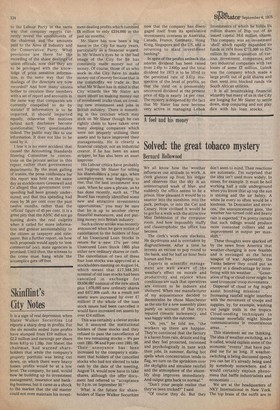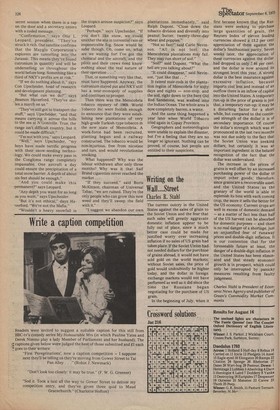Solved: the great tobacco mystery
Bernard Hollowood
We all know how the weather influences our attitude to work. A clerk glances up from his ledger and observes that the sky is an uninterrupted wash of blue, and suddenly the office seems to be a prison. How pleasant it would be to saunter into the sunshine, into the park, perhaps, or into the Cat and Canary. How civilised it would be to got for a walk with the attractive Miss Debbirion of the computer room. And how impossibly stuffy and claustrophobic the office has become.
The clerk's work-rate slackens. He daydreams and is overtaken by disgruntlement. After a time he invents an excuse to pop round to the bank, and for half an hour feels human and free.
Experts in scientific management are well aware of the weather's effect on morale and productivity and rejoice when conditions are such that operatives are content to be indoors and sheltered. When one manufacturer of my acquaintance decided to decentralise he chose Manchester as the site for a new assembly plant purely on account of that city's reputed climatic inclemency, and was happy with the outcome.
"Oh, yes," he told me, "the workers up there are happier. They're convinced that the factory is a haven from rain, drizzle and fog and they feel protected, cocooned and psychologically in tune with their jobs. In summer, during hot spells when concentration tends to flag, we turn on the sprinklers over the skylights and simulate rainfall and the atmosphere of the assembly shop improves immediately. And output gets back to normal."
"Don't your people realise that they've been tricked?" I said.
"Of course they do. But they don't seem to mind. Their reactions are automatic. I'm surprised that the idea isn't used more widely. In mines, for example. It must be hell working half a mile underground when you know that up top the sun is shining and the air balmy. A white lie every so often would be a kindness. 'In Doncaster and environs,' the announcement goes, 'the weather has turned cold and heavy rain is expected.' I'm pretty certain that such tidings would produce more contented colliers and an improvement in output per manshift."
These thoughts were sparked off by the news from America that weather-changing is now feasible and is envisaged as the latest weapon of war. Apparently, the Yanks believe they could put an enemy at a disadvantage by interfering with his weather .....Generation of fog or cloud cover might be used to conceal troop movements., . Dispersal of cloud or fog might assist bombing missions . . . Increasing rainfall might interfere with the movement of troops and supplies, by, for example, washing out jungle trails in the tropics. Cloud-seeding techniques to increase snowfalls might hinder communications. in mountainous areas ..."
This statement set me thinking. The idea of weather-switching, as it is called, would explain some of the economic "events" that have puzzled me for so long. If weatherswitching is being discussed openly you can bet it's already being used by somebody somewhere, and it would certainly explain phenomena that baffle industrialists and economists ...
We are at the headquarters of NKY International in New York. The top brass of the outfit are in secret session when there is a tap on the door and a secretary enters with a coded message.
"Confirmation," says Otis L. Leopard, president. "They've struck it rich. Our satellite confirms that the Mayglo Corporation's explorers are tunnelling into the Jurassic. This means they've found cutronium in quantity and will be underselling us throughout the world before long. Something like a third of NKY's profits are at risk."
"If we do nothing about it," says Con Upscheider, head of research and development planning.
"But what can we do?" says , Beamon Haverford. "They've stolen a march on us."
"They've still got to transport the stuff," says Upscheider, "and that means carrying it across the hills to the sea at N'Goniville. True, the range isn't difficult country, but it could be made difficult."
"I'm not with you," says Leopard.
"Well," says Upscheider, "my boys have made terrific progress with their snow-seeding technology. We could make every pass in the Congloma range completely impassable. One aircraft a day could ensure the precipitation of a total snow barrier. A depth of about ,six feet should be enough."
"And you could make this -permanent?" says Leopard.
"Any depth you want for as long as you want," says Upscheider. "But it's not ethical," days Ha .verford. "We're not the Mafia." "Wouldn't a heavy snowfall in the tropics arouse suspicion?" says Leopard.
"Perhaps," says Upscheider. "If you don't like snow, we could smother the site in torrential rain or impenetrable fog. Snow would be safer though. Oh, come on, what are we waiting for! I've got the chemical and the aircraft, and the pilots and their crews need know nothing about the real nature of their operation. . ."
That, or something very like that, must have happened. Anyway, the cutronium stayed put and NKY still has a near-monopoly of supplies and continues to prosper.
Then there was the Memcobria tobacco mystery of 1969. World Tobacco Inc were foolish enough to announce that they were establishing new plantations of very high-grade Turkish-type tobacco in the new state of Memcobria. A work-force had been recruited, planting begun and a railway constructed. The tobacco would be non-injurious, free from nicotine and tars, and would revolutionise smoking.
What happened? Why was the labour withdrawn after only three months? Why was it that Saif Brand cigarettes never reached the market ...
"If they succeed," said Boris McKinson, chairman of Universal Tabac, "we are ruined. They're the only people who can grow this new weed and they'll sweep the field with it."
"I suggest we abandon our own plantations immediately," said Ralph Dupont. "Close down the tobacco division and diversify into peanut butter, twenty-three-day wheat and poppies."
"Not so fast!" said Carlo Nevinson. "All is not lost. the Memcobrina plantations may fail. They may run short of soil."
"Soil?" said Dupont. "What the hell are you talking about?"
"It could disappear," said Nevinson, "just like that ..."
It rained stair-rods in the plantation region of Memcobria for sixty days and nights — non-stop, and the soil, right down to the bare Old Red Sandstone, was washed into the Indian Ocean. The whole area is now completely barren, a waste.
And the same thing happened a year later when World Tobacco tried again in Copay Province.
Geographers and meteorologists were unable to explain the disaster, but I've a feeling that they are no longer so ignorant. Nothing can be proved, of course, but people are entitled to their suspicions.



































 Previous page
Previous page